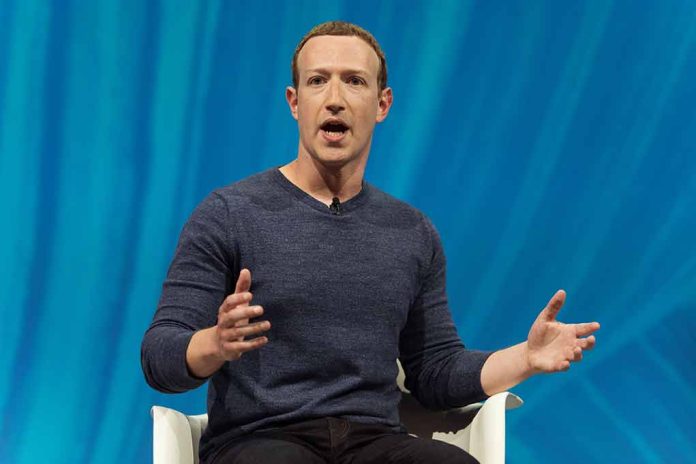
Mark Zuckerberg’s apology sparks a wave of calls for Congress to defund key government oversight agencies, signaling potential major changes in tech regulation.
At a Glance
- Mark Zuckerberg faced over 10 hours of intense questioning by Congress.
- Lawmakers feel social media tech has outpaced regulatory measures.
- Zuckerberg regrets Meta bowing to White House pressure to censor content.
- Republicans, led by Rep. Jim Jordan, celebrate Zuckerberg’s letter as a win for free speech.
- A shift towards rebalancing power and accountability between Silicon Valley and Washington D.C. may be underway.
Intense Congressional Scrutiny
Mark Zuckerberg recently faced over 10 hours of questioning by Congress, emphasizing the mounting concerns over social media’s rapid growth and regulatory shortcomings. Lawmakers underscored the drastic evolution of social media technologies that have outpaced current regulatory frameworks. Representative Greg Walden commented, “While Facebook has certainly grown, I worry it has not matured. I think it is time to ask whether Facebook may have moved too fast and broken too many things.”
Lawmakers unanimously agreed that Congress needs to step in to regulate social media platforms, though they stressed the importance of finding a balance that respects First Amendment rights and the innovation stemming from Silicon Valley. During his testimony, Zuckerberg acknowledged that “inevitable that there will need to be some regulation,” though he was noncommittal about enacting significant privacy changes.
An apology from Mark Zuckerberg to America – long, long overdue pic.twitter.com/PW94qb1RK6
— Josh Hawley (@HawleyMO) January 31, 2024
Admission of Government Pressure
In a groundbreaking admission, Zuckerberg expressed regret over Meta bowing to pressure from the Biden administration, specifically regarding the censorship of Covid-19 related content. In a letter to the House Judiciary Committee, he stated, “I believe the government pressure was wrong, and I regret that we were not more outspoken about it.” This revelation highlighted the administration’s influence over Meta to suppress content, including humor and satire related to Covid-19.
“Our position has been clear and consistent: we believe tech companies and other private actors should take into account the effects their actions have on the American people, while making independent choices about the information they present.”
Zuckerberg also admitted that Meta should not have demoted a New York Post story regarding President Biden’s family ahead of the 2020 election, which the FBI had incorrectly labeled as potential Russian disinformation. “It’s since been made clear that the reporting was not Russian disinformation, and in retrospect, we shouldn’t have demoted the story,” Zuckerberg stated. These revelations precipitated calls for Congress to defund some oversight agencies, holding them accountable for their interventions.
Mark Zuckerberg's semi-apology is not all it seems. Facebook was a wilful participant in the government's Covid censorship regime. It gladly cracked down on free speech at the behest of Biden and Fauci. Don't let him off the hook, says Tom Slaterhttps://t.co/Swdc120ZLW
— spiked (@spikedonline) August 28, 2024
Political and Legislative Implications
Republicans, spearheaded by Ohio Representative Jim Jordan, have celebrated Zuckerberg’s revelations as a significant win for free speech. The letter came at a time of intense debate surrounding the role of social media in content suppression, particularly conservative content. Elon Musk’s acquisition of Twitter (now X) and its shift towards “free speech” have also intensified scrutiny of Zuckerberg and his company. Jordan had earlier demanded internal communications from Meta and had even threatened a contempt-of-Congress hearing.
“My goal is to be neutral and not play a role one way or another—or to even appear to be playing a role,” said Zuckerberg, stressing his intention to avoid any partisan alignment in future election cycles. Consequently, he announced, “So I don’t plan on making a similar contribution this cycle.” This statement aims to mitigate accusations that his previous contributions unfairly benefited one political party. Meta has also updated several policies, including refraining from demoting content in the U.S. while waiting for fact-checkers.
“I believe the government pressure was wrong, and I regret that we were not more outspoken about it.”
The forthcoming legislative actions resulting from Zuckerberg’s apology could fundamentally reshape the dynamics between big tech and federal oversight, striving for a balanced approach to regulation that respects innovation and free speech.
Sources
- https://www.nytimes.com/2018/04/11/business/zuckerberg-facebook-congress.html
- https://www.washingtonpost.com/news/the-switch/wp/2018/04/10/transcript-of-mark-zuckerbergs-senate-hearing/
- https://www.politico.com/news/2024/08/26/zuckerberg-meta-white-house-pressure-00176399
- https://www.washingtonpost.com/news/the-switch/wp/2018/04/11/transcript-of-zuckerbergs-appearance-before-house-committee/
- https://yro.slashdot.org/story/24/08/27/0154207/zuckerberg-says-he-regrets-not-being-more-outspoken-about-government-pressure
- http://docs.house.gov/meetings/IF/IF00/20180411/108090/HHRG-115-IF00-Transcript-20180411.pdf
- https://www.bloomberg.com/news/articles/2018-04-11/zuckerberg-challenged-again-over-breaches-of-trust-with-users
- https://publicintegrity.org/inequality-poverty-opportunity/why-mark-zuckerbergs-senate-hearing-could-mean-little-for-facebooks-privacy-reform/
- https://www.aljazeera.com/news/2024/8/27/did-bidens-white-house-pressure-mark-zuckerberg-to-censor-covid-content
- https://www.reuters.com/technology/zuckerberg-says-biden-administration-pressured-meta-censor-covid-19-content-2024-08-27/










